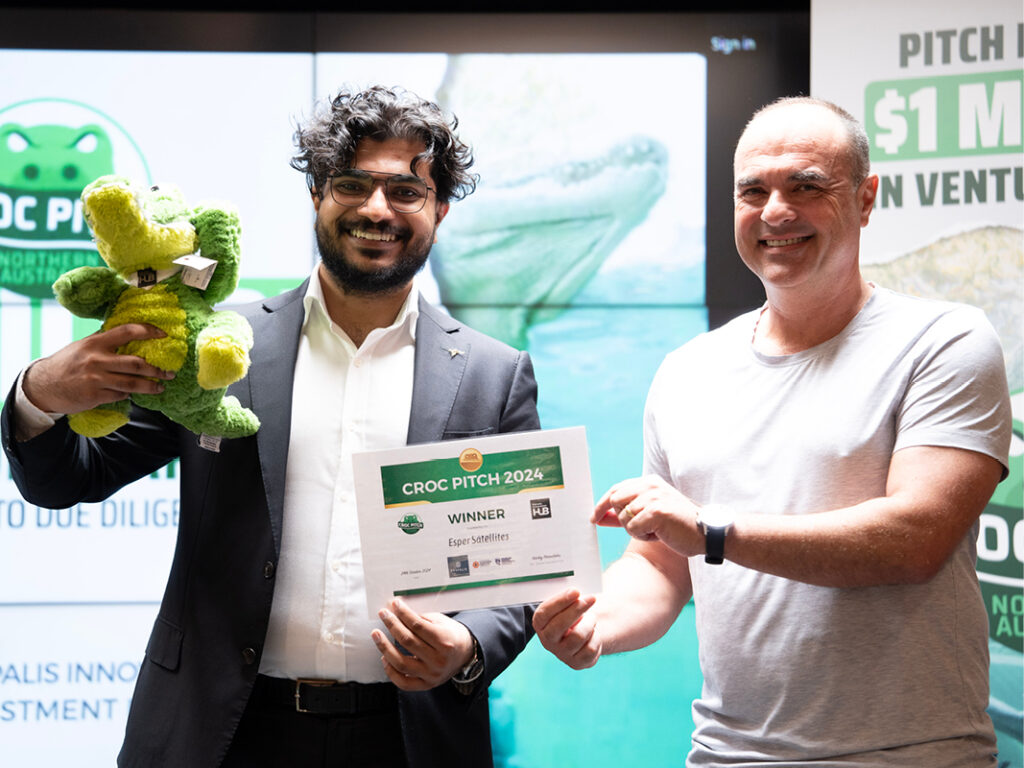Just months after winning US$1 million in seed funding at the Darwin Innovation Hub’s Croc Pitch competition, space tech startup Esper Satellites is reshaping how mining companies explore northern Australia.
The Melbourne-based company’s low-cost hyperspectral imaging sensors — mounted on satellites — are enabling faster, cheaper and less disruptive mineral exploration, allowing mining companies scanning the Northern Territory’s vast terrain to pinpoint promising drill targets with speed and precision.
“Croc Pitch marked an important step for us,” Esper Co-Founder and chief executive Shoaib Iqbal said. “It gave us credibility, investment and a launchpad into the Territory. We’ve gone from early traction to real commercial conversations with mining companies across Australia.”

Esper’s breakthrough lies in its ability to gather high-resolution spectral data that reveals the chemical composition of the Earth’s surface — at a fraction of the cost of traditional exploration methods. That data helps operators reduce reliance on ground crews and minimise environmental impact, identifying viable tenements before committing to costly drilling.
Since the Croc Pitch win, Esper has opened an office at the Darwin Innovation Hub to expand its footprint in an underexplored minerals market and build stronger links with industry, research and government in the region.
Mr Iqbal said the Territory’s investment in space infrastructure has been a major drawcard. “The NT has some of the most advanced ground station capabilities in the country, and conditions here — low light pollution, clear skies — are ideal for downlinking and operating satellites,” he said.
Esper is on the hunt for exploration partners in the NT to apply its data in geochemical mapping. “We’re not just gathering images from space — we’re turning data into decisions. Our tech is being tested on the ground, with real stakeholders, in one of the most resource-rich regions on Earth.”
The startup’s momentum extends beyond Australia. Esper joined a Northern Territory Government delegation in Singapore for deep tech roundtables, where it explored international test-bed opportunities and built ties with partners in Asia-Pacific.
Esper’s traction has caught the eye of investors, with a recent US$4 million seed round led by Paspalis Capital and Islamic financial services company Hejaz. That funding is being channelled into technical development and new satellite launches scheduled over the next two years, including its next prototype satellite, Over the Rainbow-2.
The global Earth Observation market — valued at $266 billion in 2023 — is expected to reach $700 billion by 2030. With cost-effective hyperspectral imaging tailored to resource and agriculture use cases, Esper is well-positioned to ride the wave.
The company is now actively seeking mining and exploration partners across northern Australia. “If you’ve got a tenement you’re struggling to justify drilling, our technology can help you validate that decision—fast, cheap and with minimal environmental impact,” Mr Iqbal said.
Esper’s story underscores the Croc Pitch program’s growing reputation as a springboard for globally ambitious startups. As applications open for the 2025 event, the company’s success sends a strong message to founders: the Top End is open for innovation.
Parties interested in discussing partnership opportunities with Esper can contact Shoaib Iqbal at shoaib@espersatellites.co.
This article was produced by InnovationAus.com in partnership with Paspalis.
Do you know more? Contact James Riley via Email.
